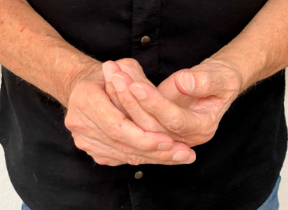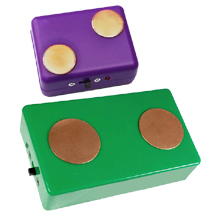Testing:
As mentioned earlier, the most accurate lab for testing parasites, Metametrix, which is the lab that diagnosed me, my husband and my mom with parasites, has merged with a company called Genova Diagnostics and they’ve changed the way they test.
However, apparently there is a test procedure called PCR that is becoming more available for people to accurately test for parasites, bacteria and virus.
“Polymerase chain reaction (PCR) is a technique that is used to amplify trace amounts of DNA (and in some instances, RNA) located in or on almost any liquid or surface where DNA strands may be deposited. The key to understanding PCR is to know that every human, animal, plant, parasite, bacterium, or virus contains genetic material such as DNA (or RNA) sequences (nucleotide sequences or pieces of DNA or RNA) that are unique to their species, and to the individual member of that species. Consequently, if a sample contains segments of DNA or RNA, PCR is a method used to amplify (make many more identical copies) of these unique sequences so they can then be used to determine with a very high probability the identity of the source (a specific person, animal, or pathogenic organism) of the trace DNA or RNA found in or on almost any sample of material.” – info from emedicinehealth.com
I don’t know the cost of PCR testing but when my family and I were tested, it was very expensive for the stool test kit. It was close to $400 per kit. For many people who have multiple symptoms, they find it much more affordable to just buy a zapper and start using it for 30 days. If their symptoms go away, they saved time and money, plus experienced relief much sooner. If their symptoms don’t go away, they’re only out a small amount of money after giving it a chance, and they can gift it to someone who will likely benefit from using it.
Symptoms of Parasites:
Here’s a list of symptoms followed by the ways in which we can contract parasites that was shared with me by my dear friend Mikey, who’s been such a great supporter of my experience and who has generously contributed excellent information regarding this subject. Thank you, Mikey!
*Please note the rest of the information below was not written by me and I have made some suggestions in a couple areas as a healthier option.*
Common Symptoms of Parasites in Humans
Constipation: Some worms, because of their shape and large size. can physically obstruct certain organs. Heavy worm infections can block the common bile duct and the intestinal tract, making elimination infrequent and difficult.
Diarrhea: Certain parasites, primarily protozoa, produce a prostaglandin (hormone-like substances found in various human tissues) which creates a sodium and chloride loss that leads to frequent watery stools. The diarrhea process in a parasite infection is, therefore, a function of the parasite, not the body’s attempt to rid itself of an infectious organism.
Gas and Bloating: Some parasites live in the upper small intestine where the inflammation they produce causes both gas and bloating. The situation can be magnified when hard-to-digest foods such as beans and raw fruits and vegetables are eaten. Persistent abdominal distention is a frequent sign of hidden invaders. These gastrointestinal symptoms can persist intermittently for many months or years if the parasites are not eliminated from the body.
Irritable bowel syndrome: Parasites can irritate and inflame the intestinal cell wall, leading to a variety of gastrointestinal symptoms and malabsorption of vital nutrients, particularly fatty substances. This malabsorption leads to bulky stools and steatorrhea (excess fat in feces).
Joint and muscle aches and pains: Parasites are known to migrate to encyst (become enclosed in a sac) in joint fluids, and worms can encyst in muscles. Once that happens, pain becomes evident and is often assumed to be caused by arthritis. Joint and muscle pains and inflammation are also the result of tissue damage caused by some parasites of the body’s ongoing immune response to their presence.
Anemia: Some varieties of intestinal worms attach themselves to the mucosal lining of the intestines and then leach nutrients from the human host. If they are present in large enough numbers, they can create enough blood loss to cause a type of iron deficiency or pernicious
Allergy: Parasites can irritate and sometimes perforate the intestinal lining, increasing bowel permeability to large undigested molecules. This can activate the body’s immune response to produce increased levels of eosinophils, one type of the body’s fighter cells. The eosinophils can inflame body tissue, resulting in an allergic reaction. Like allergy, parasites also trigger an increase in the production of immunoglobulin E (IgE).
Skin conditions: Intestinal worms can cause hives, rashes, weeping eczema, and other allergic-type skin reactions. Cutaneous ulcers, swellings and sores, popular lesions, and itchy dermatitis can all result from protozoan invasion.
Granulomas: Granulomas are tumor-like masses that encase destroyed large or parasitic eggs. They develop most often in the colon or rectal walls but can also be found in the lungs liver, peritoneum, and uterus.
Nervousness: Parasitic metabolic wastes and toxic substances can serve as irritants to the central nervous system. Restlessness and anxiety are often the result of the systemic parasite infestation. (After completing a herbal cleanse, many people swear that their persistently grouchy mates or relatives have become a lot more pleasant and patient. “The most famous tapeworm of recent years belonged to the late opera singer Maria Callas. She had a serious weight and skin problem. When the tapeworm was detected and removed, “her weight dropped, her skin improved and her temperament mellowed,” says Gittleman.)
Sleep disturbances: Multiple awakening during the night particularly between 2 and 3 AM, are possibly caused by the body’s attempts to eliminate toxic wastes via the liver. According to Chinese medicine, these hours are governed by the liver. Sleep disturbances are also caused by nocturnal exits of certain parasites through the anus, creating the intense discomfort and itching.
Teeth grinding: Bruxism – abnormal grinding, clenching, and gnashing of the teeth – has been observed in cases of parasitic infection. These symptoms are most noticeable among sleeping children. Bruxism may be a nervous response to the internal foreign irritant.
Chronic fatigue: Chronic fatigue symptoms include tiredness, flu-like complaints, apathy, depression, impaired concentration, and faulty memory. Parasites cause these physical, mental, and emotional symptoms through malnutrition resulting from malabsorption of proteins, carbohydrates, fats, and especially vitamins A and B-12.
Immune Dysfunction: Parasites depress immune system functioning by decreasing the secretion of immunoglobulin A (I&A). Their presence continuously stimulates the system response and over time can exhaust this vital defense system, leaving the body open to bacterial and viral infections.
The following conditions might also be tell-tale signs of a parasitic invasion: weight gain, excessive hunger, weight loss, bad taste in the mouth and bad breath, asthma, diabetes, epilepsy, acne, migraines, and even the biggest killers: heart disease and cancer.
Causes of Parasites:
Food
We can get parasites from food that is not adequately cooked. Meat such as pork and beef that is undercooked is the means of transmission for tapeworms, as is undercooked freshwater fish. Vegetables and fruit may come from the field or the market carrying both protozoan (single celled, microscopic) and metazoan (worm) parasites. Parasites may be added to vegetables and fruit if they are sprayed, rinsed or washed in water that has not been properly filtered. And parasites may be transferred to food by the person preparing the food if impeccable hygiene is not followed. When you eat in restaurants you have a greater chance of ingesting a parasite if you eat uncooked food, such as salads. Cooking food will eliminate most parasites and since cooked food is often handled with utensils, there is less likelihood that the food was handled with bare and perhaps unwashed hands that may have come in contact with a parasite. However, some parasites are tough and can withstand sustained high temperatures as described above in the water category. At home, soak vegetables and fruit for at least 15 minutes in a solution of two ounces of hydrogen peroxide or one ounce of common pure chlorine bleach per gallon of properly filtered water and then rinse off with pure, properly filtered water. (I prefer to wash my food with Grapefruit Seed Extract available at most health food stores or a fruit and veggie wash that contains GSE. You can also use apple cider vinegar. Alicia) Wash your hands and scrub under your finger nails before preparing or eating food. This measure of hygiene is even more important if you have pets. Once again, enjoy your food but use common sense and apply your knowledge of appropriate hygiene.
Pets
Pets are often hosts to parasites and pets share many parasites with humans. Simply stated, pets are able to lick themselves almost anywhere and then pets groom themselves. Pets love to be petted and humans love to pet them. And so the parasite is passed from pet to person. Again, always wash your hands and scrub under your finger nails after touching an animal and especially before preparing or eating food. Avoid kissing pets or letting them kiss you. And it is wise not to let pets on the bed. It is a good idea to have your pet checked by the veterinarian for parasites on a regular basis. Veterinarians seem to be more adept at finding and treating parasites than human doctors.
Sex
Oral genital sexual activity can result in the transmission of some parasites. Be impeccable in your hygiene.
Air
Some parasites can be transmitted through the air. One example is Ascaris Lumbricoides, commonly referred to as roundworm. This worm is estimated to be the most common parasite on the planet, infecting maybe one in five people. While it is more common in other countries, it is very common in the U.S. Female worms may produce 200,000 eggs a day. In areas of poor sanitation, these eggs can survive for a time in relatively dry conditions where the eggs may become airborne and inhaled by a human. This is all that is necessary for that parasite to begin the lifecycle in a human host. The most common parasite in children in the U.S. is considered to be the pinworm, or Enterobius Vermicularis. Female pinworms come out onto the skin around the anus and lay their eggs. This can cause itching. The eggs can remain viable on bedclothes, bedding, underwear, clothing and the dust in the room for days and can be transmitted by direct contact and then into the mouth or through the air. Killing pinworms is not difficult. But getting rid of a pinworm infestation can be if proper care is not taken. Vacuum meticulously. All clothing and bedding should be washed and dried in a hot drier for at least 30 minutes. Chemicals are available that are added to the wash water to kill the eggs. Dry cleaning is also recommended. While getting rid of pinworms, wear underwear that is elasticized so they fit snuggly around the thigh for 24 hours every day until the pinworms have been eradicated. Carefully remove the underwear so that any eggs that might be caught in the fabric are not lost and set them aside to be washed as described above. Change the underwear when you wake up in morning and before bed at night. Remember, the females usually come out to lay their eggs at night.
Soil
Hookworms, such as Necator Americanus and Ancylostoma Duodenale can be contracted through the soil as well as from vegetables. These worms can enter a human host by burrowing through skin of the feet if one is in the dirt with bare feet. Be careful about going barefoot. These two hookworms exist in many areas of the world. The range for Necator Americanus includes parts of New Mexico.
Fecal Matter
If you work in areas where contact with fecal matter is possible, such as cleaning toilets or changing diapers, be careful. It has been documented, for example, that giardia has been passed around at some day care centers where children in diapers are cared for.
Travel
Although many human parasites are common in the U.S., parasites are much more common in many other countries and so easier to come in contact with. Be meticulous in your habits about hygiene and consumption of food and drinks. Take a portable water filter when you travel. These are available at most outdoor/camping stores and are designed to eliminate Giardia as well as other parasites. Also, build a strong immune system before beginning your travel and regularly take nutritional and herbal products to help prevent getting parasites while you travel.
Hydrochloric Acid
People who produce lower levels of hydrochloric acid in their stomachs either naturally or because of acid reducing drugs are more vulnerable to getting parasite problems. The hydrochloric acid “digests” the protein of the parasitic cysts, eggs or other transmission forms. Discuss hydrochloric acid supplementation or ways of improving your hydrochloric acid production with your kinesiologist. (If you have low hydrochloric acid, the practice of proper food combining can help, and so does taking raw organic apple cider vinegar. If that doesn’t work, water fasting is very helpful. Alicia)
Doorknobs
Although picking up pathogens from doorknobs has become a cliché of ridicule, it is certainly possible to come into contact with a number of parasites and other pathogens from doorknobs, toilet seats or any other surface (money perhaps) where people touch. This is even truer if the surface is near a toilet. As an example let’s use Giardia, since it is common and can survive outside the body in a range of conditions for extended periods of time. A person with Giardiasis uses the toilet in a restaurant or at the movies after which they do not wash their hands. This could result in one or more Giardia cysts on their hands and when they open the door to leave the restroom those cysts might be transferred to the doorknob. The next person to touch that doorknob could pick up those cysts. And even though that person has just washed their hands with care, if they return to the restaurant or the movie and eat food with their hands, there is a risk of contracting Giardiasis. While it would be foolish to never venture out into the world for fear of “getting something,” consider developing habits that help protect yourself from the very real possibility of coming in contact with a bug you don’t want. Use your sleeve, or a paper towel or a tissue to open the door as you leave a restroom. Carry small hand sanitizer packets, such as Purell, and clean your hands before eating or touching your mouth and nose. (I do not recommend the use of hand sanitizer. I think it’s best to wash your hands regularly with a natural soap like Dr. Bronner’s and avoid antibacterial soaps. You can use essential oils instead of sanitizer too. Alicia) Some types of parasites are considered communicable and are more easily passed around in families, relationships and communities. For example, many public health authorities require that cases of Giardiasis be reported.
Summary
Parasites are a fact of life. This was well understood by most people in America up to the middle of the twentieth century. Common knowledge about preventive hygiene and annual parasite purges was passed on within families. It is not difficult to evaluate what changing factors in society resulted in the loss of the transmission of that common knowledge. But it has occurred. The parasites continue to thrive. The time has come to raise awareness about how common parasite problems are as well as how to prevent getting them and how to eliminate them when we get them. Resolving a parasite infestation is one of a handful of essential components that is absolutely necessary in order to create a strong foundation from which we can maintain or reestablish our health.
To eliminate parasites safely and effectively through the use of a Basic or Terminator Zapper visit: The Zapper Page to purchase








 He saw numerous doctors and was finally diagnosed with arthritis and sent home with medication. He was practically bed ridden. He was in a lot of pain and couldn’t even make a fist.
He saw numerous doctors and was finally diagnosed with arthritis and sent home with medication. He was practically bed ridden. He was in a lot of pain and couldn’t even make a fist.